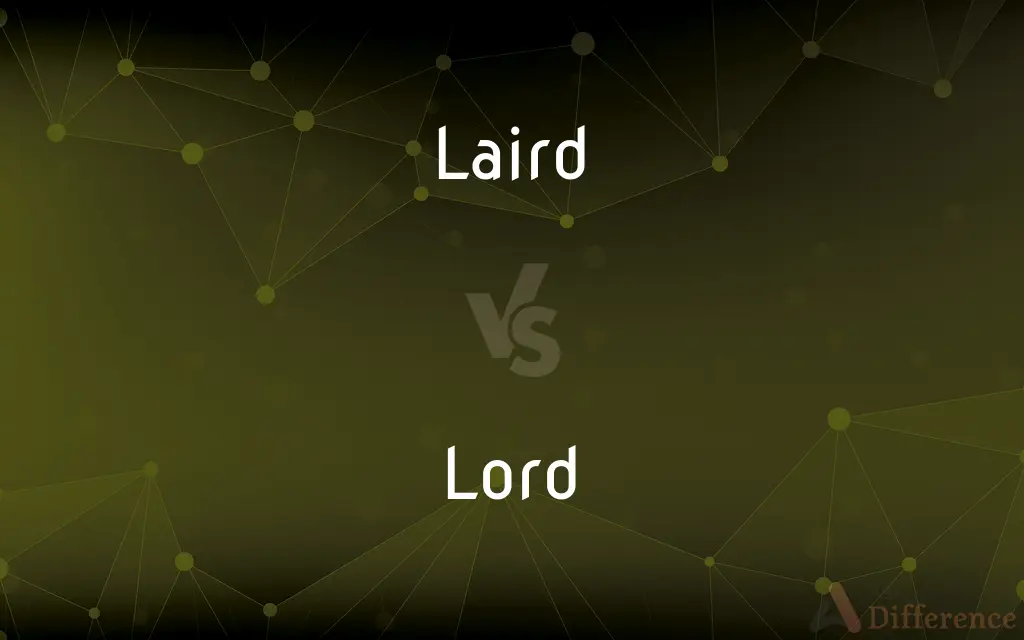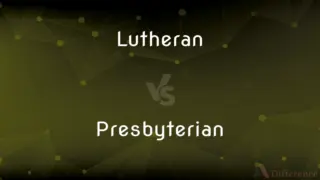Laird vs. Lord — What's the Difference?
Edited by Tayyaba Rehman — By Fiza Rafique — Updated on September 21, 2023
Laird and Lord both refer to people of rank or property, primarily in Scotland and England respectively. Laird is a Scottish term for someone who owns a large estate in Scotland but isn't necessarily noble.

Difference Between Laird and Lord
Table of Contents
ADVERTISEMENT
Key Differences
The terms "Laird" and "Lord" are commonly used to denote people of rank or property, but they are steeped in different cultural and historical contexts. Laird is a Scottish term specifically referring to someone who owns a large estate, generally in Scotland. The term Lord, however, is broader in scope, often associated with nobility or feudal authority, and is more commonly used in England and other parts of the United Kingdom.
"Laird" usually implies a landowner but does not automatically grant the person any noble status or titles. In contrast, "Lord" often comes with specific titles such as Baron, Earl, or Duke, and implies a degree of nobility. In the British peerage system, being a Lord is often hereditary and comes with certain privileges and responsibilities.
In terms of usage, "Laird" is more localized to Scotland and has Celtic roots. "Lord," however, has broader origins and is used throughout the British Isles and other English-speaking countries. It also appears more frequently in historical and biblical contexts, further broadening its scope.
It's worth mentioning that the term "Laird" is often less formal and may not require legal recognition to be used socially. On the other hand, the title "Lord" is usually more formal, and its usage is more tightly regulated, often requiring official recognition or heredity to be legitimately claimed.
Comparison Chart
Cultural Context
Scottish
British/English
ADVERTISEMENT
Ownership
Owns large estate
May or may not own land
Nobility
Not necessarily noble
Often noble or feudal
Geographical Usage
Primarily in Scotland
Throughout the UK and other English-speaking countries
Formality
Less formal
More formal and regulated
Compare with Definitions
Laird
A Scottish term for a landowner.
The Laird of the estate is well-respected in the community.
Lord
A person of rank or authority, often noble.
The Lord of the Manor is hosting a ball.
Laird
Does not imply nobility.
Being a Laird in Scotland doesn't make you a noble.
Lord
Used in religious contexts.
Praise the Lord for this bountiful harvest.
Laird
Specific to Scotland.
He became a Laird after purchasing land in the Highlands.
Lord
Lord is an appellation for a person or deity who has authority, control, or power over others, acting as a master, a chief, or a ruler. The appellation can also denote certain persons who hold a title of the peerage in the United Kingdom, or are entitled to courtesy titles.
Laird
Often a hereditary title but not exclusively.
The Laird title sometimes passes down through families.
Lord
A king.
Laird
Laird () is a generic name for the owner of a large, long-established Scottish estate. In the Scottish order of precedence a laird ranks below a baron and above a gentleman.
Lord
A territorial magnate.
Laird
The owner of a landed estate.
Lord
The proprietor of a manor.
Laird
(historical) A feudal lord in Scottish contexts.
Lord
Lords The House of Lords.
Laird
An aristocrat, particularly in Scottish contexts and in reference to the chiefs of the Scottish clans.
Lord
Used as a form of address for a marquis, an earl, or a viscount.
Laird
A landowner, particularly in Scottish contexts.
Lord
Used as the usual style for a baron.
Laird
Chiefly as laird it over: to behave like a laird, particularly to act haughtily or to domineer; to lord (it over).
Lord
Used as a courtesy title for a younger son of a duke or marquis.
Laird
A lord; a landholder, esp. one who holds land directly of the crown.
Lord
Used as a title for certain high officials and dignitaries
Lord Chamberlain.
The Lord Mayor of London.
Laird
A landowner
Lord
Used as a title for a bishop.
Laird
Less formal than Lord.
The Laird is more approachable than a Lord.
Lord
God.
Lord
(Christianity) Jesus.
Lord
A man of renowned power or authority.
Lord
A man who has mastery in a given field or activity.
Lord
(Archaic) The male head of a household.
Lord
(Archaic) A husband.
Lord
To insist upon or boast about so as to act in a domineering or superior manner
"He had lorded over her his self-proclaimed spiritual and poetic superiority" (David Leavitt).
Lord
To act in a domineering or superior manner
An upperclassman lording over the younger students.
Lord
To have a prominent or dominating position
The castle lords over the valley.
Lord
To rule over
Lorded over a vast empire.
Lord
(obsolete) The master of the servants of a household; (historical) the master of a feudal manor
Lord
(archaic) The male head of a household, a father or husband.
Lord
(archaic) The owner of a house, piece of land, or other possession
Lord
One possessing similar mastery over others; (historical) any feudal superior generally; any nobleman or aristocrat; any chief, prince, or sovereign ruler; in Scotland, a male member of the lowest rank of nobility (the equivalent rank in England is baron)
Lord
(historical) A feudal tenant holding his manor directly of the king
Lord
A peer of the realm, particularly a temporal one
Lord
A baron or lesser nobleman, as opposed to greater ones
Lord
One possessing similar mastery in figurative senses (esp. as lord of ~)
Lord
A magnate of a trade or profession.
Lord
(astrology) The heavenly body considered to possess a dominant influence over an event, time, etc.
Lord
A hunchback.
Lord
Sixpence.
Lord
Domineer or act like a lord.
Lord
(transitive) To invest with the dignity, power, and privileges of a lord; to grant the title of lord.
Lord
A hump-backed person; - so called sportively.
Lord
One who has power and authority; a master; a ruler; a governor; a prince; a proprietor, as of a manor.
But now I was the lordOf this fair mansion.
Man over menHe made not lord.
Lord
A titled nobleman., whether a peer of the realm or not; a bishop, as a member of the House of Lords; by courtesy; the son of a duke or marquis, or the eldest son of an earl; in a restricted sense, a baron, as opposed to noblemen of higher rank.
Lord
A title bestowed on the persons above named; and also, for honor, on certain official persons; as, lord advocate, lord chamberlain, lord chancellor, lord chief justice, etc.
Lord
A husband.
Thou worthy lordOf that unworthy wife that greeteth thee.
Lord
One of whom a fee or estate is held; the male owner of feudal land; as, the lord of the soil; the lord of the manor.
Lord
The Supreme Being; Jehovah.
Lord
The Savior; Jesus Christ.
Lord
To invest with the dignity, power, and privileges of a lord.
Lord
To rule or preside over as a lord.
Lord
To play the lord; to domineer; to rule with arbitrary or despotic sway; - sometimes with over; and sometimes with it in the manner of a transitive verb; as, rich students lording it over their classmates.
The whiles she lordeth in licentious bliss.
I see them lording it in London streets.
And lorded over them whom now they serve.
Lord
Terms referring to the Judeo-Christian God
Lord
A person who has general authority over others
Lord
A titled peer of the realm
Lord
Make a lord of someone
Lord
Often a hereditary title.
The title of Lord has been in his family for generations.
Lord
May or may not own land.
He's a Lord but doesn't own any estate.
Lord
Commonly used in England and the broader UK.
Lords and Ladies are a staple in British history.
Common Curiosities
What is a Lord?
A Lord is a person of rank, often noble or feudal, commonly used in England and the broader UK.
Is Laird a formal title?
It's less formal than Lord and may not require legal recognition.
Is a Laird a noble?
Not necessarily, the title Laird implies land ownership but not noble status.
Where is the term Laird mostly used?
The term is primarily used in Scotland.
Is a Lord always a noble?
Often, but not always. The title is commonly associated with nobility.
Can Laird be a hereditary title?
Sometimes, but it's not exclusively hereditary.
What is a Laird?
A Laird is a Scottish term for someone who owns a large estate in Scotland.
Do all Lords own land?
Not necessarily. The title doesn't always come with land ownership.
Is the title Lord formal?
Yes, the title is formal and often requires official recognition.
Where is the term Lord mostly used?
The term is commonly used in England and other parts of the UK.
Is Lord usually a hereditary title?
Yes, it often passes down through families.
Can a woman be a Laird?
Yes, women can also hold the title of Laird.
Can a woman be a Lord?
Traditionally no, but the term "Lady" is the female equivalent.
Do all Lairds own land?
Generally, yes. The term implies owning a large estate.
How do you formally address a Laird or a Lord?
A Laird might simply be called "Laird [Surname]," while a Lord would be formally addressed as "Lord [Surname]" or by their specific title.
Share Your Discovery

Previous Comparison
Lutheran vs. Presbyterian
Next Comparison
Interrogation vs. QuestionAuthor Spotlight
Written by
Fiza RafiqueFiza Rafique is a skilled content writer at AskDifference.com, where she meticulously refines and enhances written pieces. Drawing from her vast editorial expertise, Fiza ensures clarity, accuracy, and precision in every article. Passionate about language, she continually seeks to elevate the quality of content for readers worldwide.
Edited by
Tayyaba RehmanTayyaba Rehman is a distinguished writer, currently serving as a primary contributor to askdifference.com. As a researcher in semantics and etymology, Tayyaba's passion for the complexity of languages and their distinctions has found a perfect home on the platform. Tayyaba delves into the intricacies of language, distinguishing between commonly confused words and phrases, thereby providing clarity for readers worldwide.
















































